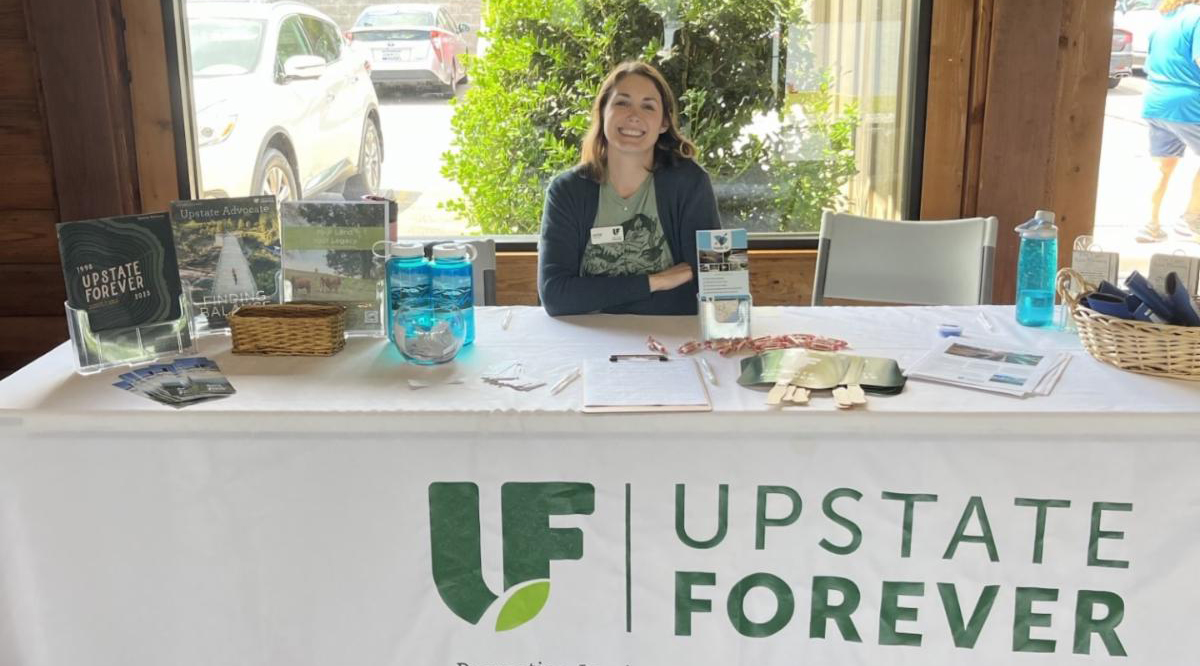We're hiring: Land Stewardship Specialist
This full-time position plays an integral role in our Stewardship and Land Management team by conducting annual monitoring visits to properties protected by conservation easements, interfacing with landowners, compiling reports, and more.
The Water Log: June 2023
June 13th, 2023
By Erika Hollis
Happy June!
The Clean Water team is excited to share and discuss the most recent updates regarding the Restore Chattooga River Gorge Initiative. With the completion of the University of Georgia's (UGA) report on the lower Chattooga River before Tugalo Dam, we are able to better understand the remarkable nature of this National Wild and Scenic River and its associated conservation values. In this June edition of the Water Log we discuss this report, updates related to the Federal Energy Regulatory Commission (FERC) ruling, and next steps.
Additionally, we are happy to share a recap of some the events we attended this past month.
Respectfully,

Erika Hollis
Clean Water Director
Upstate Forever

National Wild and Scenic River - The Chattooga River (Photo Credit: Shea Airey)
The Restore Chattooga River Gorge Initiative:
As many of our readers may remember, back in 2021 Upstate Forever reached out to request support to restore the Chattooga River Gorge. (View the Blog post HERE). As a recap, the Chattooga flows wild and free for 58 miles and is inundated at the end at Lake Tugalo, a reservoir created by the construction of the Tugalo Dam built in 1923. Both the dam and reservoir are owned and operated by Georgia Power Company.
When Georgia Power sought to invest millions of dollars to "modernize" the Tugalo facility years ahead of its official relicensing, the Restore Chattooga Gorge Coalition (RCG) -- of which UF is a partner -- was formed to build support to decommission and remove the Tugalo Dam.
RCG includes many conservation and recreation organizations invested in the longevity and health of the Chattooga River including American Rivers, Chattooga Conservancy, American Whitewater, Naturaland Trust, Georgia Canoeing Association, Savannah Riverkeeper, and Upstate Forever.
The case for decommissioning the dam includes several key points:
- The Tugalo hydro facility is at the end of its lifespan and only generates 45 megawatts — less than 1% of Georgia Power’s total energy portfolio.
- There is no development around the lake. Almost all surrounding land is owned by the State of Georgia, the U.S. Forest Service, and the S.C. Department of Natural Resources.
- Lake Tugalo is not a drinking water source for any community.
- The Lake Tugalo area is biologically rich, geologically significant, and has been identified as a resilient area for mitigating climate change impacts. The area provides habitat for many rare and endangered plants and is in the middle of the Brevard Fault Zone.
- The lake releases methane (an extremely harmful greenhouse gas) and contains massive amounts of sediment, which could eventually negatively impact dam efficiency and require costly mitigation.

Georgia Power's Tugalo Dam
UF and other partners intervened in the FERC proceeding related to Georgia Power's application to replace and upgrade four generating units in the Tugalo Dam powerhouse. Represented by the Southern Environmental Law Center (SELC), RCG urged FERC to consider the negative impacts related to extending the life of the dam by more than four decades with that investment and to more seriously and comprehensively study alternatives, including the "no-action" alternative.
Unfortunately, FERC opted to amend Georgia Power's Tugalo license, but on the positive side, emphasized that approval "in no way prejudges Commission action on future license applications". The current license expires in 2036, and the process for seeking a new license will begin in 2031.
RCG also intervened in the Georgia Public Service Commission (PSC) proceeding regarding Georgia Power's proposed 2022 Integrated Resource Plan (IRP) to seek the removal of the Tugalo modernization project from the IRP and to publicly question the need for the modernization and its dramatic estimated cost increase (from $24 million in 2021 to $115 million in 2022).
That effort was unsuccessful, and in late August 2022, RCG filed an appeal on the grounds that the PSC failed to comply with its own statutes related to Georgia Power’s intention to increase Tugalo’s capacity by more than 15% (a 45% capacity increase is proposed). A decision regarding that appeal has not yet been reached.

Historical image of the Chattooga River
Meanwhile, RCG contracted the University of Georgia in 2021 to prepare a report outlining the characteristics of the lower section of the Chattooga River that is currently inundated by Lake Tugalo. This now completed report serves as an exciting visualization of the river and gorge prior to dam construction.
According to this report, all dams have a finite life span, after which they must be either repaired, replaced, or removed; the best option for a given river depends on the services and disservices provided by the impounded versus the free-flowing river. Because the Chattooga is an important river for tourism (local and beyond), fishing, and world class whitewater paddling, the potential for those activities in the currently impounded reach is of particular interest.
The report utilized many different modeling techniques to assess the gradient, stream bank composition, and bank-full channel width. With these models, researchers were able to take a major step forward by providing a clearer vision of what the Chattooga would look like as a free-flowing river. Researchers understand the huge economic and ecological benefits that river restoration would provide for the local community.
Specifically, this report highlighted two unique stretches that make up the lowest 7km of the Chattooga River: a steep knickpoint reach (2km) and a gentler, lower graded reach (5km). A knickpoint is a part of the river or channel where there is a sharp gradient change. Few rivers in the southeastern United States exhibit such variation within such a short distance. Moreover, researchers believe that the upper knickpoint reach of bedrock channel beneath Lake Tugalo drops steeply, contains class III, IV, and V rapids, and is the steepest river segment below the Highway 76 bridge. Therefore, if this section were to be restored, it would probably resemble the dynamic and steep Five Falls section found immediately upstream. The lower 5 km of gentler grade, if restored, would provide scenic river characteristics with class I-III rapids that would be well-suited for fly fishing, paddling, floating, swimming, and aesthetic beauty.
To read this report, click here! We look forward to the next step of the process which will be utilizing these analyses to create visualizations of what the restored Chattooga would look like. If you are interested in helping to fund this process, consider donating to the RCG's Go Fund Me to support the team's legal fees and future visualization efforts.

Flyfishing on the Chattooga River (Photo Credit: Simons Welter)
May Event Recap:
Discover Your Watershed 2023
The Clean Water Team was excited to participate in this community event again this year where we were able to share key information about water resources in the Tyger River watersheds, and cost-share funding opportunities UF has available to help landowners protect and enhance water quality in their communities. To learn more about our cost-share funding opportunities, visit our website or contact the Clean Water Specialist, Rebecca Wade, by phone at (864)250-0500 ext. 134 or email!

Katie Hottel, Clean Water & GIS Manager tabling at Discover Your Watershed
Pickens County Cattlemen's Association Meeting
Rebecca Wade, Clean Water Specialist, presented to members of the Pickens County Cattlemen's Association during their meeting on May 18th. Rebecca had the privilege to join Susan Lunt, Water Resources Agent for Pickens County, to present information related to water pollution sources on agricultural lands and funding opportunities available through grants in the Three & Twenty Creek Watershed. These grants provide funds to install best management practices to improve and protect water quality on agricultural properties. Rebecca and Susan were so grateful to meet more members of our community and to bring funding opportunities to our agricultural producers!

Susan Lunt (left) and Rebecca Wade (right) at the Pickens County Cattlemen's Association Meeting on May 18th.
Until next time
Thank you for signing up to receive The Water Log, Upstate Forever’s email newsletter dedicated to Clean Water news, issues, and information. We appreciate your interest and dedication to safeguarding the Upstate’s water resources.
If you have any questions about this topic or would like to learn about another Clean Water issue in a future edition, please contact me at ehollis@upstateforever.org.

